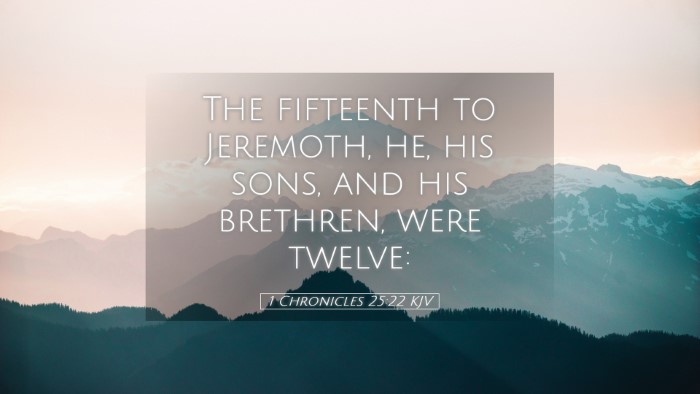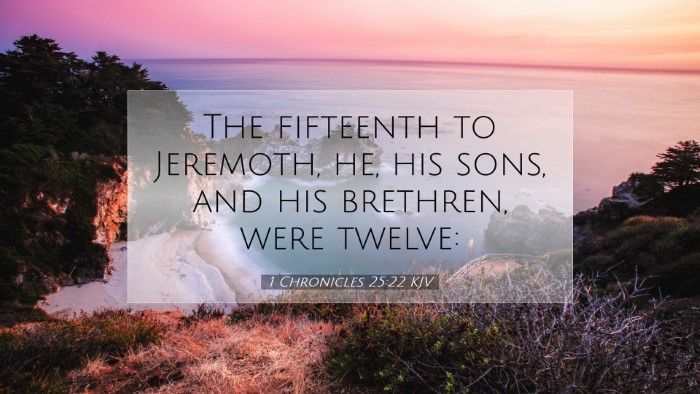Commentary on 1 Chronicles 25:22
Verse Context: 1 Chronicles 25:22 states, "The tenth to Zihri, his sons and his brethren, were twelve." This verse belongs to a broader context discussing the organization of the Levitical musicians in the service of the Temple, emphasizing the order and structure that characterized the Levites' responsibilities in worship.
Introduction
This passage, like many in 1 Chronicles, highlights the significance of order in worship and religious service. The careful enumeration of the Levites, including their roles and responsibilities, illustrates a foundational aspect of worship in Israel—one that prioritizes both the quality and the propriety of service to God.
Historical Background
Commentary by Albert Barnes: Barnes emphasizes that the organization of the Levites into specific groups was not merely a pragmatic choice but reflected a divinely instituted system of order in worship and community life. Each division was assigned distinct roles, thereby distributing responsibilities among the families and ensuring a vibrant and continuous worship atmosphere.
Musical Leadership
Matthew Henry's Perspective: Henry elaborates that this verse points to Zihri as one of the leaders among the musicians, showcasing his familial lineage's contribution to the spiritual life of Israel. The mention of twelve sons indicates a strong legacy and the ongoing generations of worshippers dedicated to God’s service. The use of music was integral in the Temple worship, and these individuals were set apart for an important ministry.
Theological Implications
Insights from Adam Clarke: Clarke highlights that the division of roles among the Levites reflects God's intention for His people to engage in worship collectively and meaningfully. The inclusion of specific names and numbers underscores the idea that every individual has a role in God’s kingdom and that their contributions are noted in His plan. The representation of Zihri's descendants as leaders in worship establishes a theological precedent about the importance of lineage and ministry, illustrating that God uses structured communities for His purposes.
Lessons for Today
- The Importance of Order: The organization of the Levitical musicians can serve as a model for modern worship practices, highlighting how order and structure contribute to a successful and meaningful worship experience.
- Legacy of Worship: The reference to Zihri’s descendants illustrates the idea of passing down spiritual heritage. It encourages contemporary worship leaders to foster a culture of worship that engages future generations.
- Every Role Matters: This passage serves to remind us that each person within the church has a significant role in worship. Just as each Levite had a duty, so do all believers contribute to the greater body of Christ.
Conclusion
1 Chronicles 25:22 may appear as a simple listing of names and numbers, but when we delve deeper, we find profound insights regarding order, ministry, and divine intention. The careful assembly of the Levites and their roles in worship highlights God’s care for structure in worship and the importance of each person's place within His plan. As pastors, students, theologians, and scholars, we are invited to reflect on how we can embody these principles in our contemporary worship settings, ensuring that every participant understands their invaluable contribution to the worship of our Lord.
Additional Reflections
In light of this passage, we might ask ourselves:
- How do we foster an environment that respects the order and structure of worship?
- In what ways are we actively passing down our spiritual heritage to future generations?
- Do we recognize and celebrate the unique contributions of each individual in our community?


